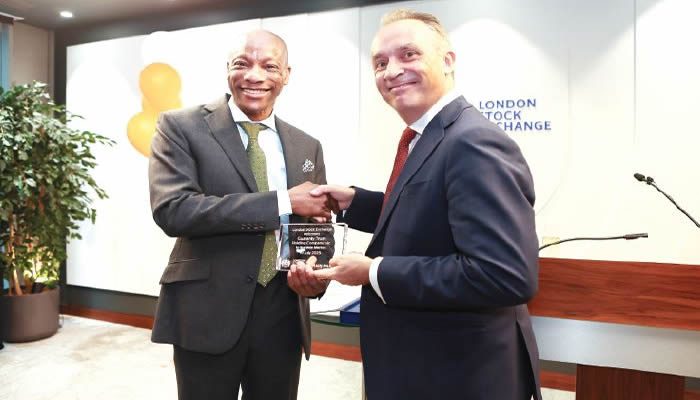Africa
From Lagos To London: GTCO’s Journey Of Trust And Transformation -By Isaac Asabor
For customers, GTCO remains a trusted service provider. For investors, it remains a reliable vehicle for long-term value. For Nigeria’s corporate sector, it is a blueprint, an example of how ambition can be rooted in principle, and how growth can be achieved without cutting corners.

When a Nigerian company successfully crosses over to the London Stock Exchange (LSE), it is more than a corporate milestone, it is a powerful statement. That was the case last Thursday when Guaranty Trust Holding Company Plc (GTCO) made history by becoming the first West African financial institution to be listed on the LSE. Already a heavyweight on the Nigerian Exchange Limited (NGX), GTCO is now dual-listed, and the implications of this move are far-reaching, not just for the company, but for the Nigerian financial ecosystem at large.
This development is not the product of chance or a craving for global applause. It is the result of strategic planning, transparency, investor inclusiveness, and consistent governance, qualities that have positioned GTCO as a financial institution worthy of trust, both for customers and portfolio investors.
GTCO’s debut on the LSE is not just a ceremonial stamp of international relevance. It is a calculated step towards broadening access to capital and deepening investor confidence across two key markets, Nigeria and the United Kingdom. This move effectively opens GTCO to a wider pool of institutional investors and gives it the agility to raise funds either locally or internationally, depending on prevailing conditions.
Describing the dual listing as “the best of both worlds,” GTCO’s leadership made it clear that the decision was anchored in sound corporate logic. More importantly, it demonstrates the bank’s desire to de-risk its growth ambitions by creating optionality: to grow within Nigeria and simultaneously tap into foreign markets without over-reliance on either.
In a time when most institutions seeking to raise capital lean heavily on foreign investors, often at the expense of their domestic base, GTCO chose a more inclusive path. With over 50% of its shareholder base made up of Nigerian retail investors, the company prioritized this group in the first phase of its capital raise. It successfully raised ₦209 billion locally before turning to the international market for the remaining funds needed to meet its ₦500 billion target.
This two-phase strategy reflects a deep understanding of shareholder sentiment and a respect for the loyal investor base that helped build the brand. It also reaffirms GTCO’s reputation as a people-focused institution, one that understands the delicate balance between local relevance and global expansion.
One of the recurring problems in Nigeria’s financial market is the disconnect between shareholder expectations and corporate delivery. GTCO, however, has chosen to be explicit and accountable. It has committed to ensuring that Nigerian shareholders, especially those affected by inflation and economic volatility, receive a minimum dividend yield of 15%. For foreign institutional investors, the company aims to maintain a 25% Return on Equity (ROE), a performance bar that speaks volumes about the group’s confidence in its future growth trajectory.
These clearly defined expectations are rare in Nigeria’s corporate environment and highlight GTCO’s mature investor relations strategy. In a climate where performance is often ambiguous and returns are inconsistent, GTCO is anchoring itself as a benchmark institution.
GTCO’s expansion is not driven by the need for global bragging rights. Rather than stretching itself across dozens of countries to prove a point, the group is focused on building dominance in fewer, strategic markets. It currently generates about 67% of its profits from Nigeria, 27% from West Africa, while its contributions from East Africa and the UK stand at 1.5% and 1.8%, respectively.
Looking ahead, GTCO plans to deepen its presence in countries like Senegal and across East Africa, while cautiously exploring opportunities in Asia, particularly the Far East. The United States is not an immediate priority, and that is telling. The institution is not chasing scale for scale’s sake, it seeking market leadership and meaningful impact wherever it operates.
The goal is clear: Be in fewer than 15 countries across Africa, but rank in the top five in every single one. That is the kind of measured ambition Nigeria’s financial sector desperately needs.
Listing on the London Stock Exchange is not for the faint-hearted. GTCO had to meet the stringent standards of the UK’s Financial Conduct Authority (FCA), undergoing intense due diligence that examined not just its financial statements, but also its public reputation and corporate behavior.
One revealing insight from GTCO’s leadership is that during this due diligence process, everything ever said about the company or its executives came under review. This includes media reports, online commentary, and past controversies. In a country where misinformation is rife and media responsibility is often ignored, this underscores a critical point: Reputation is a form of capital. And GTCO, by all indications, has maintained a balance sheet of integrity.
This experience should serve as a lesson to Nigerian businesses: international expansion demands local accountability. The way a company conducts itself at home has direct implications for its global aspirations.
GTCO’s leadership has also shown remarkable maturity in dealing with Nigeria’s regulatory environment. On the Central Bank of Nigeria’s (CBN) planned exit from forbearance policies, the company’s view was blunt but fair: “It should not have come as a surprise.” Unlike many other institutions that claim regulatory ambush, GTCO acknowledged that there was ample notice and time to prepare.
On the issue of Cash Reserve Ratio (CRR), the company’s position was pragmatic. It recognizes that Nigeria is still dealing with a liquidity overhang, and expects the CBN to loosen CRR over time, but only when macroeconomic conditions improve. This kind of realism, neither overly optimistic nor bitterly cynical, is the mark of a well-governed institution.
At a time when many financial institutions are merely surviving, GTCO is thriving, with vision, discipline, and transparency. The group’s transformation from a commercial bank to a multi-faceted holding company is no accident. It is a carefully executed shift that reflects not just growth, but institutional maturity.
Its dual listing on the LSE may be the headline, but the real story is deeper: it is about a Nigerian institution that is methodically proving that global relevance is possible when you do the work, follow the rules, and stay true to your values.
For customers, GTCO remains a trusted service provider. For investors, it remains a reliable vehicle for long-term value. For Nigeria’s corporate sector, it is a blueprint, an example of how ambition can be rooted in principle, and how growth can be achieved without cutting corners.
From Lagos to London, GTCO’s journey is not just a corporate story, it is a symbol of what Nigerian companies can achieve when strategy meets integrity.























